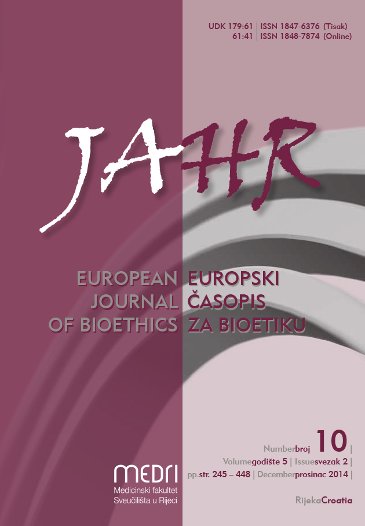Why teach “Bioethics and Human Rights” to healthcare professions undergraduates?
Keywords:
Bioethics, Human Rights, Biolaw, medical students, Nuremberg Trials, Codes of Medical Ethics, conscientious objection.Abstract
This article highlights the importance of teaching “bioethics and human rights” to
undergraduate students seeking health care degrees and illustrates how this topic fits well within
these programs of studies. Historical, cultural, anthropological and practical reasons support
teaching these topics as enrichment of medical training. The years after the Second World
War showed how bioethics, human rights and medicine are closely intertwined. Moreover the
relationship between human rights and bioethics has grown ever closer increasingly involving
medicine and health care professionals. The authors observe that medical students have to face
a cultural pluralism in bioethics and biolaw and we give students the opportunity to develop
their critical thinking and logical argumentation abilities as well as their interest in academic
research. Furthermore, the authors – who draw up briefly the experience of the Institute of
Bioethics at the Faculty of Medicine and Surgery of the UCSC (Rome) - assert the necessity
to help medical students to be respectful of patients in every clinical setting. It is therefore
of utmost importance to train students to focus on the ethical dimension of care and to
make good ethical decisions even in dilemmatic cases. To achieve this outcome, healthcare
professionals should possess an integral vision of their work (technical and humanistic
competence) and sharp skills to reflect in depth, avoiding superficiality and negligence. From
this perspective, the teaching of “bioethics and human rights” could be very useful.
Downloads
Published
Issue
Section
License
Authors who publish with this journal agree to the following terms:
- Authors retain copyright and grant the journal right of first publication with the work simultaneously licensed under a Creative Commons Attribution License that allows others to share the work with an acknowledgement of the work's authorship and initial publication in this journal.
- Authors are able to enter into separate, additional contractual arrangements for the non-exclusive distribution of the journal's published version of the work (e.g., post it to an institutional repository or publish it in a book), with an acknowledgement of its initial publication in this journal.
- Authors are permitted and encouraged to post their work online (e.g., in institutional repositories or on their website) prior to and during the submission process, as it can lead to productive exchanges, as well as earlier and greater citation of published work (See The Effect of Open Access).



